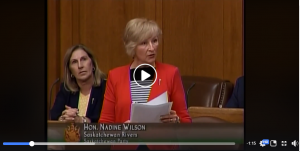This session, I have asked the Saskatchewan government questions about its’ participation and plans to integrate Saskatchewan people into mass Digital ID, and received these answers.
Written Questions:
1) When did Saskatchewan become a member of the Digital Identification and Authentication Council of Canada (DIACC)?
Answer – Saskatchewan joined DIACC in June 2019 and was a member until June 2021. No decision has been made regarding renewal.
2) Who made the decision to join DIACC?
Answer- The former Ministry of Central Services (now the Ministry of SaskBuilds and Procurement made the decision to join DIACC in order to help shape a Pan-Canadian Trust Framework. DIACC’S principles emphasize topics like privacy, security and providing Canadian’s choice and convenience.)
3) What consultation processes were used to obtain public input and opinion?
Answer – No formal consultation occurred.
4) What obligations does the province of Saskatchewan have to DIACC by being a member.
Answer – Membership in DIACC is non-binding and places no obligations on participating jurisdictions.
So, through DIACC, Saskatchewan has helped create the Pan-Canadian Trust Network. To date, it has not renewed membership in DIACC, but in 2021, SaskBuilds did post a Request for Proposal to develop a Digital ID system for Saskatchewan. I asked about this in the house on March 24, 2022.
The transcript from Hansard is as follows:
—Ms. Wilson: — Thank you, Mr. Speaker. In the last few weeks, there’s a topic that I’m being asked about. That is, what is the Saskatchewan individual digital identity roadmap? And I know some other members of this House are also being asked about digital ID [identification] because I’m cc’d on those emails. And I also noticed that the tender closed on January 4th. Mr. Speaker, people want to know, who is the government working with to implement an actual mass digital ID system that will link all of our personal information to one source? And why are they only hearing about it now? There’s going to be business programming, qualifying for programs, and monitoring small businesses. I wonder how many members of this House are aware of this and if everyone in the House is in favour of it. According to the DIACC [Digital Identification and Authentication Council of Canada] framework, basic access to services such as health, works, student loans, qualifying for disabilities, managing land use, shift in social attitudes towards health and lifestyle will be digitalization. So my question is, will the Saskatchewan government ensure the privacy of the information as per the privacy policies? Thank you.
The Speaker: — I recognize the Minister of SaskBuilds and Procurement.
Hon. Mr. Reiter: — Thank you, Mr. Speaker. Mr. Speaker, Sask service connect is some very preliminary work that’s being done by officials in SaskBuilds in the IT [information technology] department, Mr. Speaker, in an effort to improve quality of life and access to government programs for all citizens of the province, Mr. Speaker. To the member’s question, we take privacy of our citizens very, very serious, Mr. Speaker. That’s why the Privacy Commissioner, their office has been and will continue to be engaged every step of the way on this, Mr. Speaker. To other parts of the member’s question, the intent here is, for example, we frequently get . . . all governments get concerns about timelines, waiting on hold on the phone, lineups at an office. This would be an attempt to rectify those sorts of things, Mr. Speaker. But as of right now, the RFP [request for proposal] is closed. There’s been no contracts issued, Mr. Speaker. There’s been no final decisions made, Mr. Speaker. If we do decide to proceed with this, we’ll be extremely cautious to make sure that citizens’ privacy is protected. Thank you, Mr. Speaker.” —
I was pleased that Minister Reiter chose to answer my question in a clear, civil manner. This was a refreshing change from the toxic atmosphere that has permeated this session. The decorum of the house should always be respectful, as it sets the tone for behaviour in society.
As to the Minister’s answer, he states the government will be ‘extremely cautious to make sure that citizens’ privacy is protected’.
My confidence about that is shaky to say the least. Saskatchewan people just went through a period in which they were forced to disclose their private medical data to employers, businesses and universities in order to work, get an education and attend functions. And, it was done primarily through Digital ID.
At the same time, Canadians watched how easy it was for the federal government to seize bank accounts, cancel insurance and restrict travel of people who do not agree with them, practically rendering them non-persons.
Before those events, citizens might have been naïve enough to trust they would be protected from abuse by government under Digital ID. After that massive wake-up call, the ‘inconvenience’ of using traditional forms of ID is preferable to following the Digital ID roadmap being pushed on the world by unelected elites with globalist corporate interests.
——–30——–




























